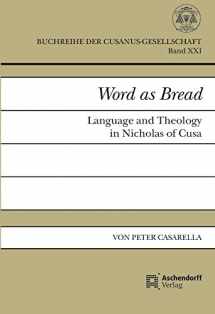
Word as Bread: Language and Theology in Nicholas of Cusa (Buchreihe Der Cusanus-Gesellschaft)
Book details
Summary
Description
This study examines the Verbum speculation of Nicholas of Cusa. The investigation concentrates equally on the concept of language that he inherited from medieval and Quattrocento sources and on the Christian theology of the Word that he wove together using his own resources and distinctive approaches. It includes a consideration of the resonances between Gadamer's hermeneutical theory and Cusanus's unfolding of a productive and rhetorically-oriented concept of the Word. The next section offers a detailed examination of the medieval and humanistic sources for his theology of the Word, paying special attention to Albertism, Ramon Llull, and the role played by Heymeric of Camp. This study highlights a development in Cusanus's thought that takes place after 1450 towards a speculative synthesis of human ars through the semiotic appearance of the power and intentionality of the word. It is also argued that even in the late works Cusanus does not submit to the nominalist tendencies of the via moderna. A penultimate section offers a detailed study of the role of faith in the acceptance of the divine Word. Cusanus fuses the unformed discursive knowledge that is known by analogy with the formal certainty received through intellectual vision. Faith and speculative knowledge unite to lead the believer beyond the images that words convey to the unifying image of the divine Word. The last section reviews recent literature on language and theology in Nicholas of Cusa and indicates a path as to how research on the speculative thought of Cusanus and on intercultural theology could move forward together in the future.


We would LOVE it if you could help us and other readers by reviewing the book
Book review



